- Home
- Peter Orullian
At the Manger Page 16
At the Manger Read online
Page 16
A long, awkward moment passed before Papa finally spoke.
With kind eyes, Papa said, “Luke, take what you need.”
The carpenter’s mouthed opened and closed, but he said nothing, seeming to be too overwhelmed by emotion to speak. The corners of his mouth tugged as though he might weep. He looked at the tools in his hands, gripping them tightly, purposefully. Then, he pulled Papa into a tight embrace and whispered over his shoulder, “I will repay you.”
Papa patted Luke’s back. “You will have the chance to help me someday. I’m almost sure of it. A carpenter’s trade is always in demand, right?” He stood back and scratched at his stubbly chin. “Besides, would I let you forget that you owe me?” A broad smile spread on Papa’s lips, revealing a small bit of olive lodged between his lower teeth.
Laughing with him, Luke shook his head. “No, I suppose you wouldn’t.” They clasped hands and Luke turned toward the groves, nodding toward me and Mama before he stepped into the night.
When he had been gone several moments, Papa turned to me. “There’s still time for our talk.”
Without thinking, I blurted, “But what about my tree?”
“Your tree will be fine one day without you,” Papa replied.
“And so will you,” I countered. My anger boiled inside me. I would not let him come between me and my grove. “I certainly would not have given the carpenter permission to take the limbs off one of my trees.”
Papa did not raise his ‘day-end’ voice. He merely turned without a word and trundled toward his groves. Watching him go, I realized something I hadn’t considered: our talk might have eased those few hours of work. He was tired and needed my help. Perhaps more than that: he was lonely, and wanted company. I hadn’t needed to remind him of the danger our diminished crop portended for us. I’d listened to him rise and return while I enjoyed the comfort of my bed, as he worked to ensure a productive season. Everywhere the heat and drought had taken its toll, and no less so on my Papa. How much wearier must he have been than me, and yet I put my own needs before his. He worked through the baking sun to keep whatever promises he’d made to Mama and me. I held one allegiance: myself.
Ashamed, I raced after him, but stopped just beyond the square of light falling from the door. The smell of harvest lingered in the air, olives collected in bushels, oil presses slick with their work. A warm night breeze blew the fragrance south, a kind of invitation. I breathed deeply of the familiar smell, my feelings suddenly a tangle in my stomach.
Before long, Papa had disappeared among the trees, and I ran toward Jeshua, able to think of nothing else to do.
My regret had almost faded as I rounded the last turn toward my tree. I skidded to a halt in alarm: a small heard of goats milled around my tree, a herdsman asleep not far away. The animals moved and bleated, rooting over the ground for fresh grass to graze. Two of the beasts nibbled at Jeshua’s branches.
I tried to scream, but the shock of what I saw robbed me of breath. Quickly, I bent and took up a rock, hurling it at the goats. My aim caused one of them to jump back and cast me a blank stare as it chewed some of Jeshua’s leaves in its crooked teeth. The other animal continued to eat my tree, unaffected. I sprinted toward the beast, my voice breaking free as I ran. A great shriek tore from my throat and filled the darkening night with anger. The herdsman awoke at my cry in time to see me tackle the mindless goat.
I pummeled the animal with my tiny fists, glad for every whining bleat it made. The other animals backed away, scattering from around my tree. The herdsman stood, and hurried steps approached me. I paid them no mind, punishing the goat for wounding my little grove.
The awful stench of its breath and tongue brought new anger, and I wrenched on the beast’s neck savagely. Suddenly, the goat and I were separated. Instead, I stood looking into the confused and irritated face of the herdsman. He seemed to expect an answer. I gave him one, spitting in his face and trying to kick him.
Holding me at bay, he raised a hand as if to strike me.
“Hold!” The command echoed up the hill, freezing the herdsman’s hand in mid-air.
I struggled to look around, and saw Papa coming up the trail at a brisk walk. The herdsman released me, and I fell to the ground. I scampered to Jeshua’s side as Papa came to a stop beside me.
“If she’s yours,” the herdsman said, ire tinting his words, “then you’ll want to explain why she attacked my herd. I could have compensation from you for her assault.”
Papa said nothing and looked down at me. His attention shifted to Jeshua, then back at the herdsman. “You’re a negligent herder, my fellow. Bringing your goats into my orchard. Are you so blind that you did not see this delicate tree here?” Drawing his brows together, Papa focused a stern gaze on the man.
The herdsman stuttered in reply, “That tree there? You can’t be serious. It’s a weed. My animal is worth a lot more than a large twig growing on a barren hill.”
Papa pointed a powerful arm at the herdsman. “And my daughter is worth more than everything you own. Get off of my land, and be quick! If I change my mind about it, I’ll take my justice this very night beneath a merciless sky for your hand raised against my child.”
I had never heard Papa talk that way before. I dared not move or breathe. The herdsman backed slowly away, drawing his goats with him. After several paces, he quickened his step and the herd followed him down the hill.
When the receding steps could no more be heard, Papa knelt beside me, and together we looked at Jeshua.
“He’s going to die, isn’t he?”
Papa put delicate hands on Jeshua’s torn and chewed branches. He spent several moments inspecting them before turning his heavy eyes toward me. “Your tree’s chances are not good, Drupe.”
I began to weep.
“But,” he added quickly, “we will do all we can. The rest we’ll leave to Yahweh.”
“What does Yahweh care about one little tree?” I looked at Jeshua’s torn bark.
Papa did not answer. He put his hand over mine, just as he’d done the night he agreed to let me have my tree, and started to pray. It was not a short prayer. Twice I opened my eyes as Papa spoke his reverent words, and saw night full and dark around us. On he prayed, his coarse hand over mine, the salty smell of him and his day’s labor thick in the air, his gruff voice supplicating Eternal Father. Sometime during that long prayer on my distant hill, I began to believe Jeshua would live. I squeezed Papa’s rough fingers, and prayed with him.
Our prayers were answered. Jeshua lived.
A few weeks later, as I walked home from my friend Hezrah’s house, a flake floated down on my nose. I wiped it away. A moment later another flake fell on my arm. I studied the ashen bit closely before casting my eyes heavenward. A rain of similar flakes fell lazily, filling the sky with darkness and soot. Though I’d never seen it, Papa had told me about the rain of fire. I ran and soon saw in the distance a fiery glow on the hill. Gritty pieces of the ashen rain got into my eyes and mouth. The ground plumed with each running stride I took, and the blaze upon the meadows grew brighter, the air hotter.
I got to our home and saw Mama putting things on a cart harnessed to our mule. Papa knelt at the edge of the workshop. He was praying, and crying, his hands outstretched to catch the ashen waste that was all that remained of his olive groves. Up the hill, great fires swept the last of the trees, consuming them quickly. Suddenly, I thought of Jeshua.
I raced from the house, ignoring Mama’s warnings. I ran as fast as I could, and tripped on a rock, scraping my hand as I scrambled up the incline of the hill. I ignored the cut in my palm and got to my feet, running again to protect my tree.
As I came around the final hill, I saw that Jeshua still stood. The fires had not passed along the brush of the ground and consumed him. I quickly cleared the area of plants and wood, and fashioned a wide ring of rocks around him. Then I sat on the ground to watch the continuing rain of burnt olive leaves. In my heart I felt both pain and relief. Papa’s orchards were burnt
to nothing, but my tree was safe. I wondered if Papa would take my tree. Sitting there, I began a vigil to guard Jeshua as much from Papa as from the fire.
Several hours later, Papa found me asleep, curled around Jeshua’s thin trunk. He carried me home, and the lingering scent of fire and ashes grew stronger with every step he took. I fell to sleep beneath my covers that night to the muted sounds of Papa and Mama crying behind their door.
~ * ~
Two nights later a knock came at our door. “David, it’s me, Matthew. Please, let me in. I have news.”
Papa went to the door. His sandals leaving new bits of ash to speckle our floor. The smell of smoke cloaked everything. He opened the door and Matthew’s bright, animated face shone in at us. Mama did not greet him, but continued to prepare our supper.
“What is it, Matthew? This is not a good time.” A bitter stare twisted Papa’s words into a snarl.
“It is the coming of our deliverance! Forget your orchard. All will be made new.” Enthusiasm poured from Matthew’s wide eyes and hurried speech, enticing us to be caught in its happy contagion. Papa only sighed and retired to his chair.
Matthew stepped in, closing the door behind him.
“Unless you can bring my trees back from the ashes,” Papa said, pointing at the ashes on the floor, “don’t talk to me of deliverance.”
Matthew quickly took a chair and sat beside Papa. “It is come to pass, David! Born this very night in Bethlehem is the Christ! An angel has appeared to the men in the fields and spoken these very words.”
Once again I saw the look upon Papa’s face. I was glad to see it. Since the fires, the soot seemed always to be on his cheeks, and angry thoughts constantly drew his lips into a frown. But now, his jaw dropped and his eyes seemed to see things far away.
Mama stopped her preparations and drew close.
“Yes, David, it is so,” Matthew affirmed. “Even now, as I sit here speaking to you, a babe is nestled in the stable at Michael’s inn. In the night sky a great star shows the path that leads to his bed. This is the miracle we have been waiting for! Come with me! I go now, to greet him.” Matthew rose.
Papa stood, his body trembling as he struggled to issue commands. “Elizabeth, put out the fire. Delilah, prepare a fresh bowl of olives to present . . .” His voice faltered. There were no fresh olives to prepare, his crop having been destroyed when fire took the storage buildings along with the orchards. Papa sat down heavily and cupped his face in his hands. “Our messiah finally come, and I have no olives of which to make a gift to him.”
Mama put her hand on Papa’s shoulder, and Matthew quietly opened the door. “David, you should come. He is but a babe and could want nothing from you. Don’t delay. Prepare your family, and come look upon the baby king.” He did not wait for a reply, but stole off into the night.
As he left, I went to the window and searched for the star of which Matthew spoke. I did not have to look long. It gleamed bright and beautiful, touching the edges of everything with a great silver light. Papa had sometimes spoken of the meanings in the stars. He’d often lain in the grassy meadow beside our home and nestled me beside him as he pointed to the glimmering lights. At the ends of his fingers, I identified those bits of heaven, and learned of the reverence Papa kept for the sacred. Looking back at him sitting with his face cupped in his hands, love swelled in my narrow chest for a man who toiled in the earth and soil of this ancestral home, but regarded with such wonder and respect the holy symbols set high in the sky.
I jumped to my feet. “Papa, we are going! You and Mama prepare yourselves and head toward the city. I will catch up.”
“Elizabeth, hush, child! We are destitute. We have lost everything. Please, sit down.” He spoke through the fingers cradling his brow.
“No! I will not. You had better do as I say, because I will soon be on the road to Bethlehem to find this baby, and you wouldn’t want anything to happen to me as I walk alone in the night.” I leapt to the door and dashed away before Papa could catch me. He called after me, but I did not heed his cries.
In moments, I had reached Jeshua. The shining star illuminated him with a warm glow. I sat near his small trunk, just inside the circle of stones, and spoke to him.
“Jeshua, I know you haven’t yet borne any olives for harvest, but there is a greater need tonight than for mere drupes. I do not wish to harm you, but your branches are all that are left of Papa’s orchard. I must take one to give to this babe. Do you understand?” My words were soft, but so still was the air that I could hear them reaching well into the hills.
I waited as though my tree might reply. I surveyed every part of each small branch, tentatively touching some. The scars from the goats could still be seen. But the light of the star above made everything appear new, fresh. It frosted the ash from my Papa’s burning trees, giving everything a delicate look, like new-fallen snow. I hesitated to cut a branch from Jeshua’s young trunk. As I waited to know if I should really do it, I looked back the way I’d come, and saw my own footprints in the ash. I remembered Papa walking here with me to plant my first tree for my own grove. The leaves, bark, and branches of Papa’s olive trees—his life—coated the world around me, and only my tree had been spared. When I told Papa to stop yelling, he had done so. When I asked for my own tree, he had given it to me. When I refused to help him harvest his crop, instead to tend my own growing orchard, he’d said nothing of his own weariness or need, and let me go. Then, when at last he’d come to find me that night, he’d knelt with me and prayed over my tree.
Lovingly, I removed one of Jeshua’s limbs and said a prayer that my tree would mend. Then, I ran toward Bethlehem.
I knew where Michael’s stable was located. He always bought a great many olives from Papa for his inn. Finding the stable wouldn’t have been difficult anyway. The bright star seemed to guide me, and a crowd of people gathered at its entrance. Papa and Mama stood to one side, looking in toward the manger.
I ran to them and pulled at Papa’s sleeve. “Here, give him this.” I handed Papa the olive branch. Papa took Jeshua’s limb. He nearly dropped it, his fingers trembling mightily as he took hold of it. “Elizabeth, is this—”
“It’s all right, Papa. I know Jeshua would want it this way. I was careful, and he will heal. Now you can give the baby this branch. It is not as good as olives, but it is what olives come from. And I think he’ll understand.”
“Little Drupe,” Papa murmured, his voice quavering. “Thank you.” He bent and kissed me tenderly, tears glistening in his eyes. He then took me by the hand and led me past the others to the soft lamplight of the inner stable.
We waited a moment together, and Papa wiped his eyes. He placed the olive branch in my hand and clasped my small fingers gently with his own large palms. When we laid Jeshua’s limb at the foot of the cradle, I thought I could smell the sweet fragrance of olive groves. In that moment, I knew my grove would flower one day, and that our family would walk together beneath an earth-cloud of drupe blossoms.
Father’s Vineyard
MY FATHER HAD grand plans for me. Tutors came daily to lead me in an array of lessons, from history, mathematics, and oration, to music, painting, and poetry. Papa desired that I would rise to an office in Caesar’s court. Stubbornly unrefined that I was, it seemed no lesson ever began without papa pulling straw from my hair or running a washcloth under my nose and over my chin to wipe away grape stains.
“These are the finest instructors money can buy,” he’d intone impatiently. “Several jugs just to secure a week of instruction. I know you’re just nine, Julius, but you must pay attention if you are to do more with your life than raise grapes.”
Usually I ignored his complaints, gazing past him to the fields and barns, hoping he wouldn’t notice my dirty, bare feet. Most of my life I seemed only to be his frustration. He cultivated his parcel of Etrurian land to produce one of Rome’s finest wines, whilst I eluded him at every opportunity to play with the animals in the stables or run the furrows
between the grapevines.
One afternoon, I stepped from the house and saw Papa engaged in conversation with two men in clean, white togas. Spotting me, he called me over.
“This is my son, Julius,” he announced proudly, as I ambled up, munching a bunch of grapes.
Papa looked down at me, a frown tugging his mouth and brow taut. I knew that look; it meant my cheeks bore smudges, and my mouth the grime of juice I hadn’t bothered to wipe away. Brusquely, Papa tousled my hair, probably hoping to casually clear the bits of hay from my head. I looked up at the visitors and plopped another grape in my mouth.
“Hello,” I mumbled through a mouth of sweet pulp.
“This, then, is the boy in training?” one man questioned stiffly.
“He is, Gaius,” Papa admitted. A firm hand on my shoulder prompted me to quickly gulp my bite and stand straighten
“Decorum lessons have yet to begin, I would imagine,” the second man commented arrogantly. “This one will need some polish if you expect our recommendation for military service in the finest army the world has ever known. Your vintages will earn you the opportunity, Brutus, but the child will appear as a . . . withered grape, sour to the taste, if his manners are as brusque in the ranks of Caesar’s army. A political career begins with courtesy.”
“I assure you, Nius, the boy has great promise.” Papa smiled proudly. “Already I have had to contract teachers with more skill because my son grows bored from the ease of his assignments. He’ll no doubt make a fine addition to the civility and purpose of Roman expansion.” He bowed deferentially to the Roman squires.
Gaius chuffed mildly, rocking onto his toes before settling back to earth. He appeared to disdain the need to tread with other mortals. “Perhaps,” he said. Then, a curious smile drew one corner of his mouth up in a sardonic curve. “So bright is he that you would have no objection to our submitting some questions to him?” Gaius’ brow arched dangerously.
Papa nervously cleared his throat. I grew weary of my tutors to be sure, but not from greatness of intelligence as he claimed.

 At the Manger
At the Manger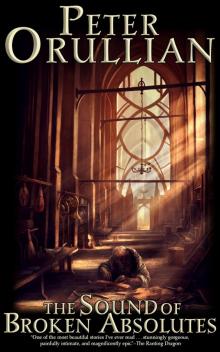 The Sound of Broken Absolutes
The Sound of Broken Absolutes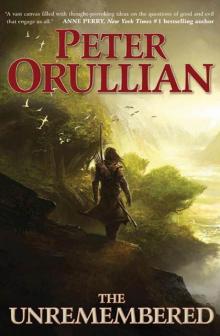 The Unremembered: Book One of The Vault of Heaven
The Unremembered: Book One of The Vault of Heaven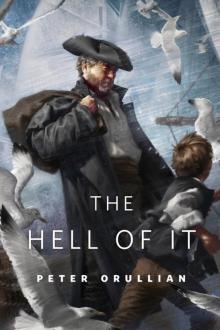 The Hell of It
The Hell of It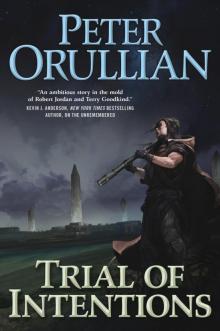 Trial of Intentions
Trial of Intentions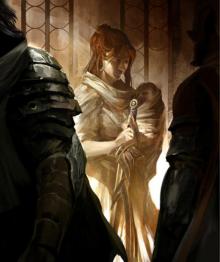 The Great Defense of Layosah
The Great Defense of Layosah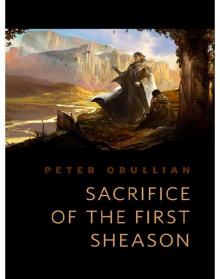 Sacrifice of the First Sheason
Sacrifice of the First Sheason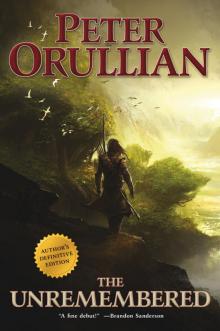 The Unremembered
The Unremembered